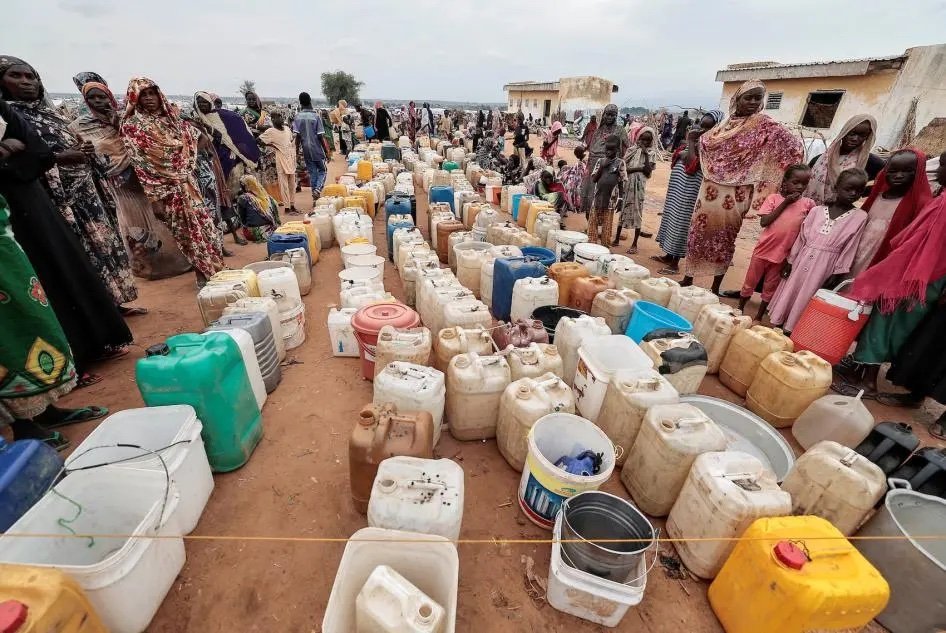“The World’s Largest Hunger Crisis”: Civil War, Displacement, Outbreaks, and More in Sudan
Photo via Reuters
SARA MEDINA: The United Nations has recognized the current humanitarian crisis in Sudan amidst its ongoing civil war as the “world’s largest hunger crisis” and the “worst displacement crisis in the world.” Escalating political violence in Sudan over the past year has resulted in increased levels of food insecurity and communicable disease, and there are few functional health facilities left standing. Given Sudan’s troubled history of civil war, religious persecution, and human rights issues, it is vital to raise awareness of the situation abroad and accelerate negotiations to combat the health and humanitarian crisis faced by the Sudanese population.
Sudan is no stranger to civil war. From 1983 to 2005, Sudan suffered 2 million casualties in a war stemming from the internal divide between the wealthier northern Arab-Muslim region and the poorer southern Christian region. The peace treaty in 2005 granted the South autonomy, ultimately leading to its 2011 secession and the formation of the Republic of South Sudan.
There is also a long history of human rights violations and discrimination in Sudan. The practice of slavery has persisted in Sudan, and it is estimated that tens of thousands of Sudanese women and children have been abducted and are currently enslaved. These women and children often face physical and sexual abuse, leaving lasting physiological and psychological scars.
The government of Sudan has also heavily harassed and persecuted non-Muslims. The building and repair of churches has been illegal in Khartoum for over fifty years, and Christian leaders have been subject to charges of “conspiracy and sabotage” for critiquing the regime. Even within the Muslim population, the government imposes a single interpretation of Islam and targets sects deemed to be impure. In particular, the dictatorship of Omar al-Bashir from 1989 to 2019 committed genocide against non-Arabs and persecuted the Christian population.
The current conflict in Sudan, a power struggle between the Sudanese Armed Forces (SAF) and the Rapid Support Forces (RSF), a paramilitary group, began on Apr. 15, 2023. While these two groups had previously worked together to topple the al-Bashir regime, they were unable to negotiate on the terms of the proposed democratic transition.
Since April 2023, about 10.5 million people have been displaced. Nearly 2 million of them have fled to the unstable region that surrounds Sudan, including Chad, Ethiopia, and South Sudan, states without the capacity to handle a large-scale refugee crisis.
Displacement of this magnitude exposes refugees to a number of health risks. Overcrowded and unsanitary conditions can foster the spread of communicable diseases, such as the current outbreaks of dengue fever and cholera. Cholera is transmitted through water or food contaminated with feces of infected individuals, while dengue is transmitted via bites of infected Ae. aegypti mosquitoes. Because of the lack of proper water, sanitation, and hygiene in refugee camps, fecal contamination leading to the spread of cholera is more likely. Additionally, the large number of refugees living in close quarters will attract Ae. aegypti mosquitoes, which tend to populate in overcrowded areas.
The World Food Programme estimates that 18 million people in Sudan are currently facing acute hunger, with about one-quarter of these people in “emergency levels of hunger.” The effects of this food insecurity are irreversible. Exposure to chronic or recurrent malnutrition as a child can lead to stunting, which hinders a child’s ability to reach his or her developmental potential. Lack of proper nutrients during pregnancy, as well as earlier in a woman’s life, increases the risk of complications during pregnancy and childbirth, including hemorrhage, preeclampsia, and death. The impact of food insecurity may span generations, as the child is more likely to be developmentally delayed, low birth weight, or stillborn.
Considering that so many are in dire need of health services, the destruction of healthcare infrastructure within conflict zones in Sudan is of particular concern. More than 70% of hospitals are out of service. 17 hospitals have been directly attacked by artillery, of which 12 have been converted into military camps by the RSF.
So, is there hope for peace? Can international interventions have any effect? Most recently, on Mar. 8, the United Nations Security Council (UNSC) called for an immediate ceasefire in Sudan, proposing the cessation of violence during the Muslim holy month of Ramadan which began on Mar. 11.
The SAF initially agreed to negotiations with the RSF mediated by Libya and Turkey. However, these peace talks fell through days later, when an SAF general refused a ceasefire unless the RSF withdrew from civilian sites. The failure of all parties to halt violence and address the humanitarian crisis during a month of spirituality, generosity, and forgiveness is shameful.
As a Muslim American who observed the month of Ramadan this year, I was deeply conscious of the privilege I had that allowed me to pray, reflect, and fast without living in fear and wondering if tomorrow was promised. In a troubling time when many Muslim populations globally are in conflict zones and in the midst of humanitarian crises (in Sudan but also in Gaza, Syria, Yemen, and elsewhere), continuing the usual festivities at the conclusion of the month was difficult for many.
However, there exists a pressing gap in information disseminated in the United States. Compared to other ongoing conflicts, the crisis in Sudan is not heavily reported on in mainstream media, and there are few advocating for the wellbeing of the Sudanese people. No one conflict is inherently more pressing than another, but the lack of awareness of all conflicts, including the war in Sudan, is unjust. Raising awareness in the United States and other nations is crucial to elicit domestic and international support for greater humanitarian assistance as well as increased international pressure for negotiations.
Sara Medina is a freshman in the School of Health studying Global Health with a minor in Government. She is from Southborough, Massachusetts. She is interested in the impact of world politics on population health.

